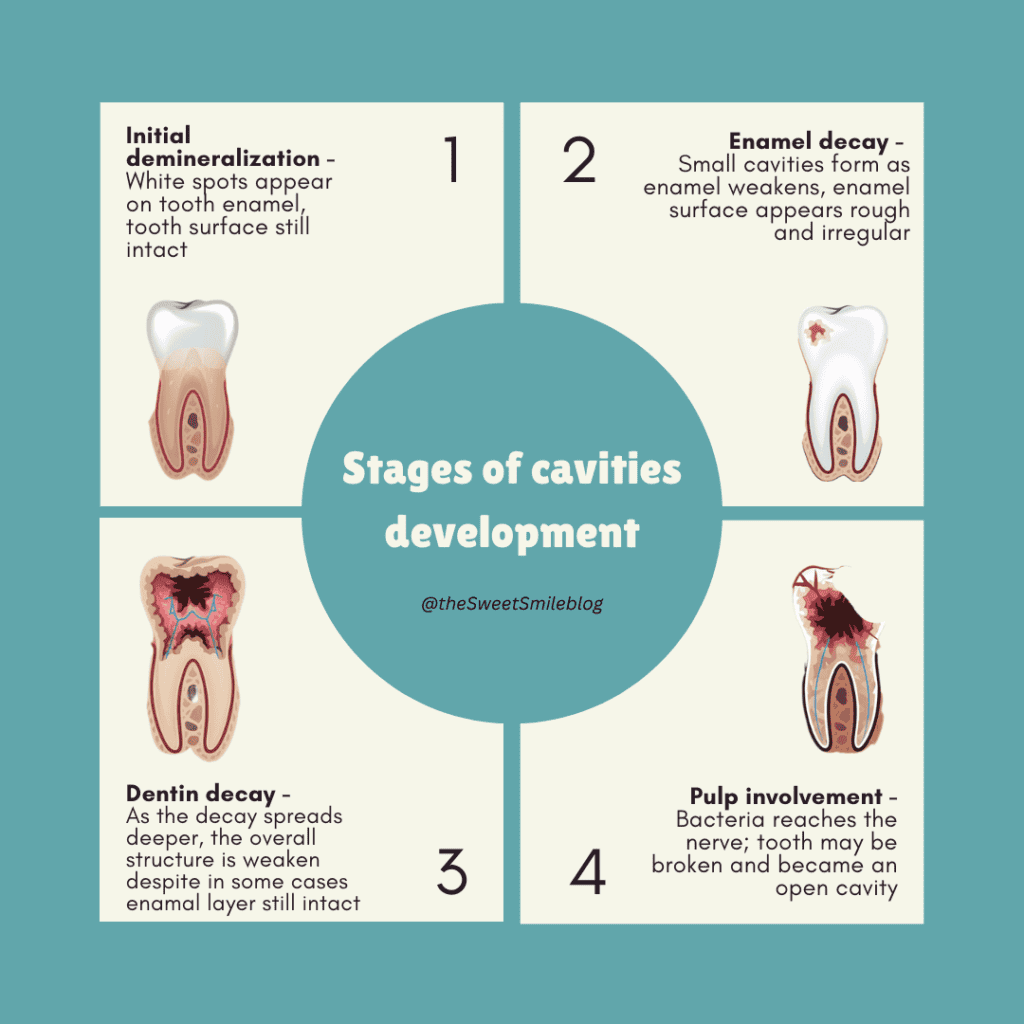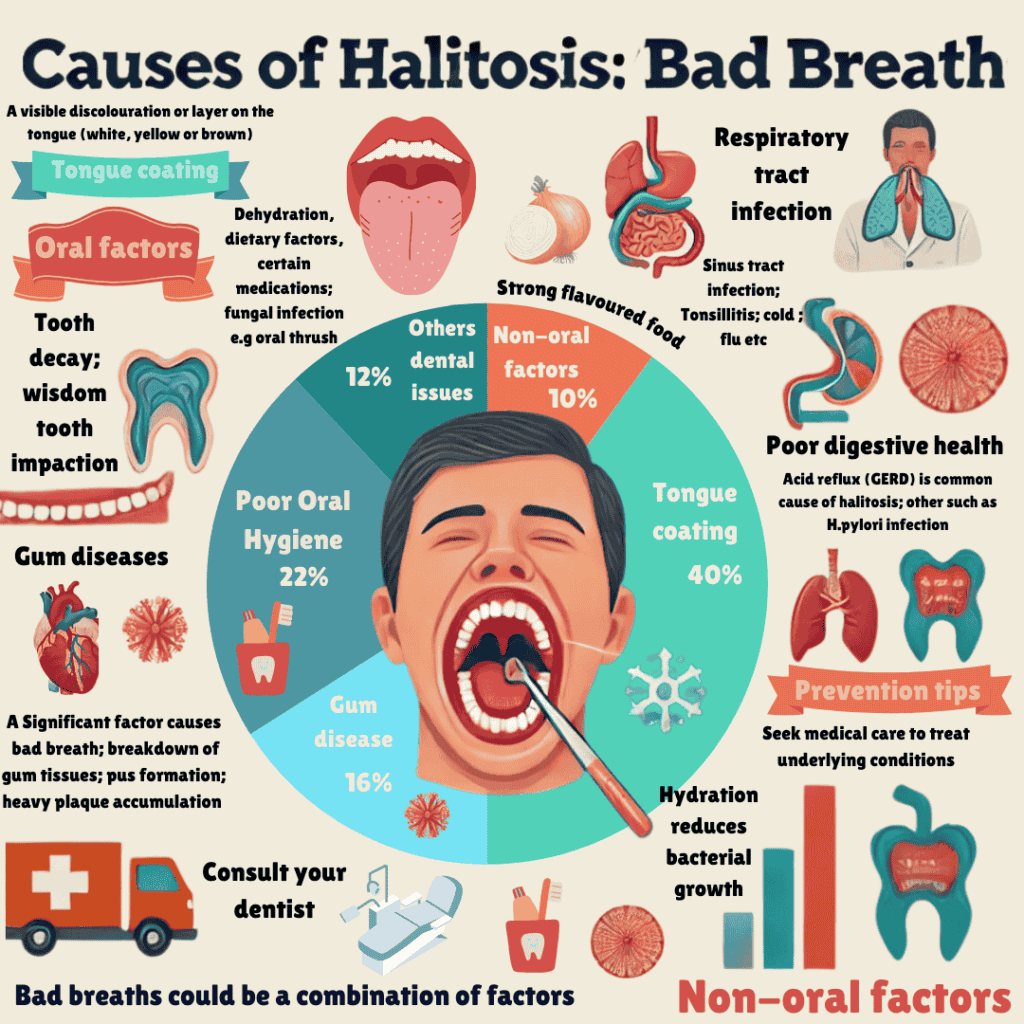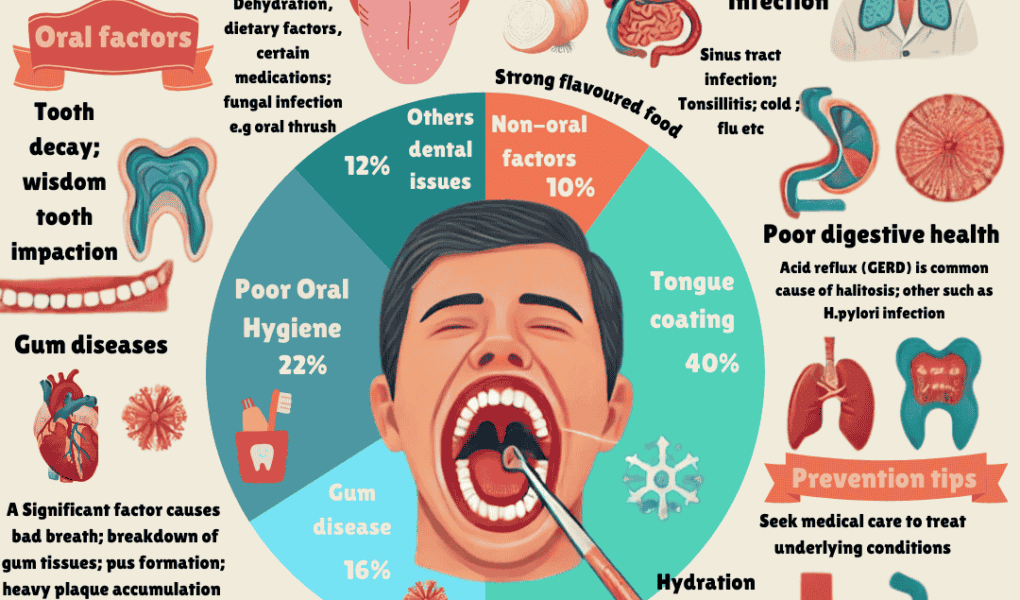A decaying tooth can be a silent culprit behind persistent bad breath. Many dentists would agree that bad breath is one of the common reasons patients seek for dental treatment. Even when patients practice meticulous oral hygiene at home, they might mentioned that the unpleasant smell still does not go away. Whether this issue is quietly raised by a loved one or you are the one always mindful about your own health. Bad breath can indicate various oral diseases, if left untreated, these conditions may deteriorate and lead to more serious issues.
While it may seem obvious that a decaying tooth causes bad breath, the process of developing dental caries is much more complex than simply eating chocolates and ending up with a rotten tooth.
Cavities might gone un-noticed for years, until it gets worse
Dental cavities can develop silently over extended periods, often showing no obvious symptoms in their early stages. In other words, each cavity has its own timeline. In addition, the rate of progression is not linear. Whether the process is chronic or acute in nature, it determines by the dynamic process between our saliva’s pH balance and our host defence system, i.e. the ability of fight off bacteria by our saliva, how well we clean our teeth and our diet etc.
The complexity of what create a cavity goes far beyond what we learnt in school, since then we probably carry this concept into adulthood and never bridged this knowledge gap. Check out my book “The Zen of Teeth“, which I shared my professional knowledge and explained how we can connect the missing pieces to attain better oral health.
Stages of cavities development
The progression of a tooth cavity typically follows distinct stages:
- Initial demineralization – Tooth surface is still intact but white spots appear on tooth enamel; tooth may remain at this stage or reversible if the oral conditions is favourable e.g improved diet, improved saliva immune ability, better oral hygiene
- Enamel decay – Small cavities form as enamel weakens, enamel surfaces starts to become rough and irregular; new pathways created which accelerate the progression of bacterial into the tooth structure
- Dentin decay – Decay spreads deeper into dentin layer, causing sensitivity
- At this point, the overall tooth structure is weaken due to the loss of mineral both inner dentin and outer enamel layers. The tooth becomes softer, any sudden impact force on the tooth especially when we bite hard would likely break the tooth surface. The tooth is cracked open like an egg-shell. Unfortunately, this permanent damage and open cavity will be an easy spot where food debris and bacterial will stagnant. Hence, producing various compound which are responsible for the unpleasant breath.
Does dead tooth smells?
If we ignore the constant bad smells from the tooth, the cavity will further progress, the following will likely to happen. Although, many cavities development would progress much faster from the inner dentin layer, while the enamel still look intact.
- Pulp involvement – When bacteria reach the nerve, it triggers a series of inflammation response within nerve system , in a simple word, it is a toothache!
- Abscess formation – Infection spreads beyond the root, the nerve and cells within the tooth eventually have dead. The by-products of the inflammation produce pus which then exit the tooth from the tip end of tooth.
The infection and pus formation at this stage not only causes significant discomfort. These bacterial produce volatile sulfur compounds as they break down proteins, resulting in a particularly foul odor that can be detected even during normal conversation. The presence often accompanied with fever, facial swelling which often requires immediate attention to the dentist. Any severe infection has the potential to spread to other parts of the body.

Bad breath coming from wisdom teeth
Wisdom teeth, the third molars, statistically around 75% of adult population have impacted wisdom teeth. It is an extremely common event. Impacted teeth could mean teeth is only partially or fully covered by either gum tissue, jaw bone or both. Because of this particular position, it always surrounds by deeper pocket space around the it which harbours food particule, bacteria. Due to rear position, even with small head toothbrush, cleansing is always a challenging task. In case of acute infection, pus and suppuration discharged from the inflammed tissue contribute a strong odour of the oral cavity.
Bad smells alone cannot conclude it is caused by a rotten tooth
While tooth decay is a common cause of bad breath, other oral factors commonly such as gum disease, poor oral hygiene, dry mouth contribute to this. Less common but severe condition for example oral cancers is another factor. Non-oral factors, e.g digestive system issues, certain food substances, medical conditions or certain medications are some of the common aspects for bad breaths.

Management of bad breath caused by rotten teeth
It is essential to seek dentist’s advise especially if the tooth has broken structure already. The tooth would require professional intervention to rebuild the lost structures. To close the gap which previous harbour food debris and bacteria. Depending on the severity of the decay, treatment options for rotten teeth may include:
- Fillings: To repair small cavities and restore tooth structure
- Root canal therapy: To clean out infected nerve tissues and cells within the tooth, then a cap is required to prevent tooth fracture
- Tooth extraction: Indicated when the tooth is grossly decayed which is beyond repair.
The options of mouthwash or toothpaste is not an appropriate option in the case of rotten tooth. It cannot address the underlying issues. Instead, the affected tooth may deteriorate further due to delay treatment.
Can home remedies rectify bad breath from a decaying tooth
In my personal opinion and daily habit, home remedies are good when the condition is mild or pre-occurance. In the case of tooth decay, when in the early stage of caries development, some toothpastes or mouthrinse does have the potential to replenish the lost mineral in the tooth structure. However, when the cavity became deeper or a hole has already created, there are no home remedies would filled up a decay tooth magically. Not a way it can restore the structure, mechanical intervention is paramount to build up the lost surface due to bacterial ingression. It is crucial for the long-term longevity of our dentition, to seek professional care for a lasting solution.




Thanks for this information is amazing this block and didactic! From Argentina Gracias por esta información y su nivel didáctico.